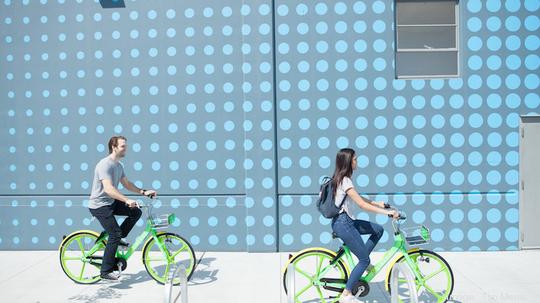
Chicago’s dockless bike-sharing pilot is coming to an end Nov. 1, and to help determine if and how to expand the new transportation in the city, officials are gathering data about riders’ experiences in a new survey.
The pilot, which launched May 1, operated throughout 10 wards on the city’s South Side in neighborhoods like Chatham, Calumet Heights and Roseland. The first dockless bikeshare program in Illinois originally launched in April when San Mateo, Calif.-based Lime brought its bikes to Rockford.
In the survey, riders are asked how often they rode a dockless bike, their reasons for taking one and which brand they preferred. In the pilot, three dockless bike companies participated, including Uber's Jump, Boston-based Pace and Lime.
Additionally, Ofo operated its bikes in the pilot initially until July when it determined that the city’s controversial “lock-to” rules were hurting their business and dropped out. Shortly before Ofo left Chicago and many other U.S. cities, Chicago tweaked the rules, requiring all participating companies to equip their bikes with a U-lock or other locking mechanism that allows it to attach to a bike rack or other fixed structure. Bike-sharing companies that didn’t incorporate bike locks were only allowed to operate 50 bikes in Chicago as opposed to 350.
Dockless bikes have been introduced in cities across the country, from New York to San Francisco. They are found, unlocked and paid for using smartphone apps, and when they’re not in use, they are meant to be placed along sidewalks and other public spaces. However, this parking method has in some cities resulted in cluttered sidewalks, damaged bikes and theft, a major reason Chicago pushed for bike-sharing companies here to incorporate bike locks.
In the city’s survey, riders are asked their preference on using wheel-lock versus lock-to methods. The survey also asks whether riders prefer these bike-sharing services over docked bikeshare services like Divvy. The city has asked riders to take the survey by Nov. 21.
Pace, which has had one of the largest presences in Chicago since the pilot launched, said in July that it had five employees on the ground in Chicago and had plans to deploy up to 350 bikes. And because of the bike lock rule, they’ve been working with private property owners, park districts and city government to install more public bike racks in the city.
As part of that mission, Pace launched Pace Parking, a parking platform, similar to a bike rack, for dockless bikes, electric bikes and scooters.
Besides dockless bikes, Chicagoans got a glimpse of dockless scooters this summer as well. Lime debuted its scooters in Chicago at one of the city’s street fests in July. They were part of a larger pop-up demo series that Lime was doing separately from the dockless bike-sharing pilot.
Similarly, Bird, an electric scooter company based in Santa Monica, Calif., tested its scooters in Chicago during Wicker Park Fest in July. At the time, Bird officials said they were working to make their service permanently available in Chicago.
Officials from the Chicago Department of Transportation have been mum on sharing their specific plans for dockless bikes and scooters in the city, saying that they have yet to be decided.








